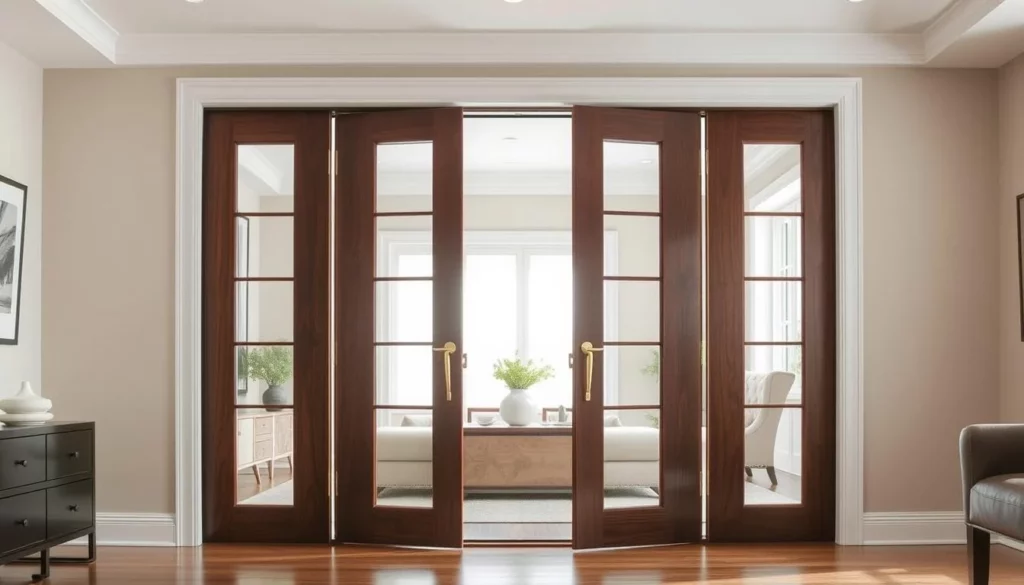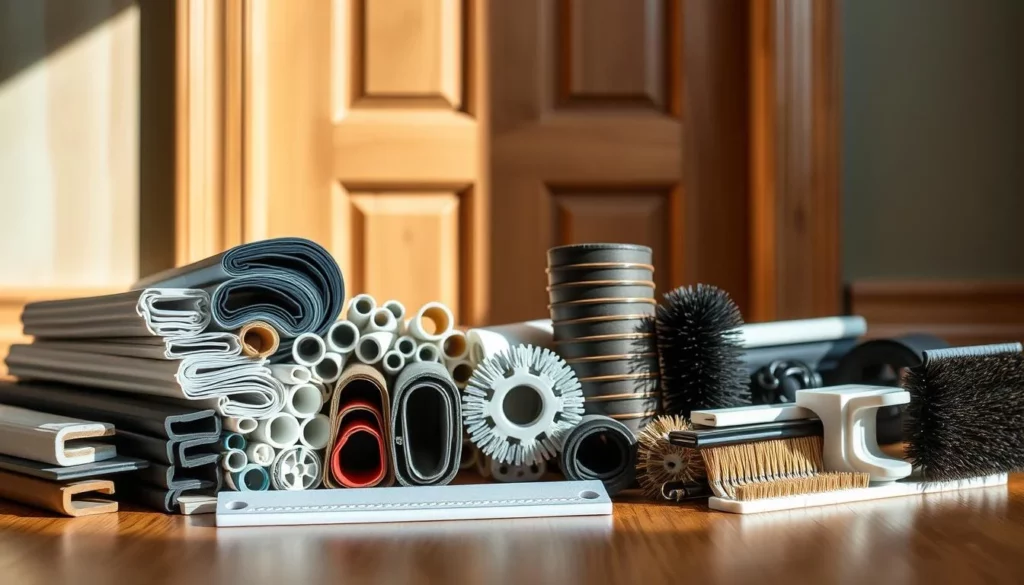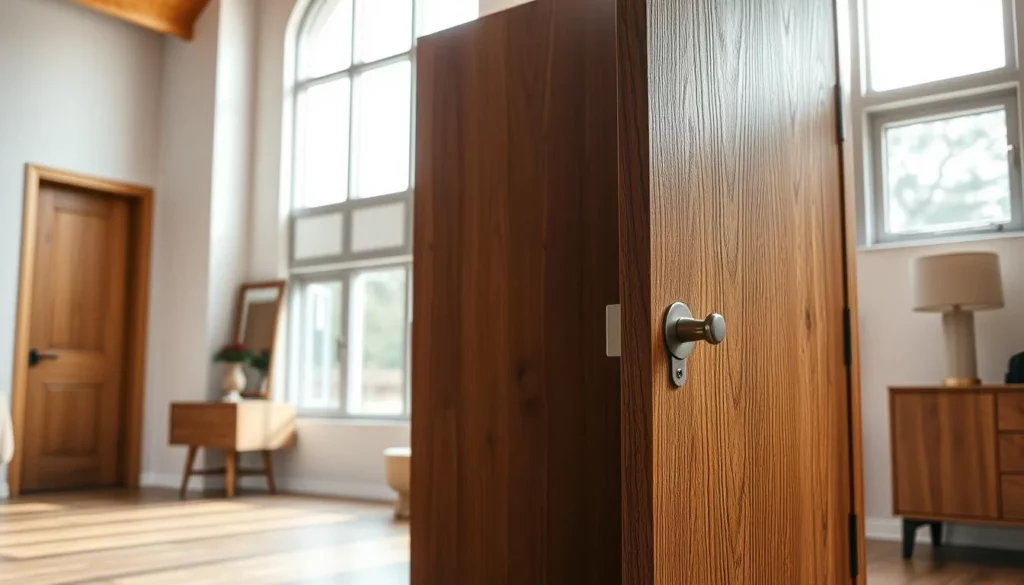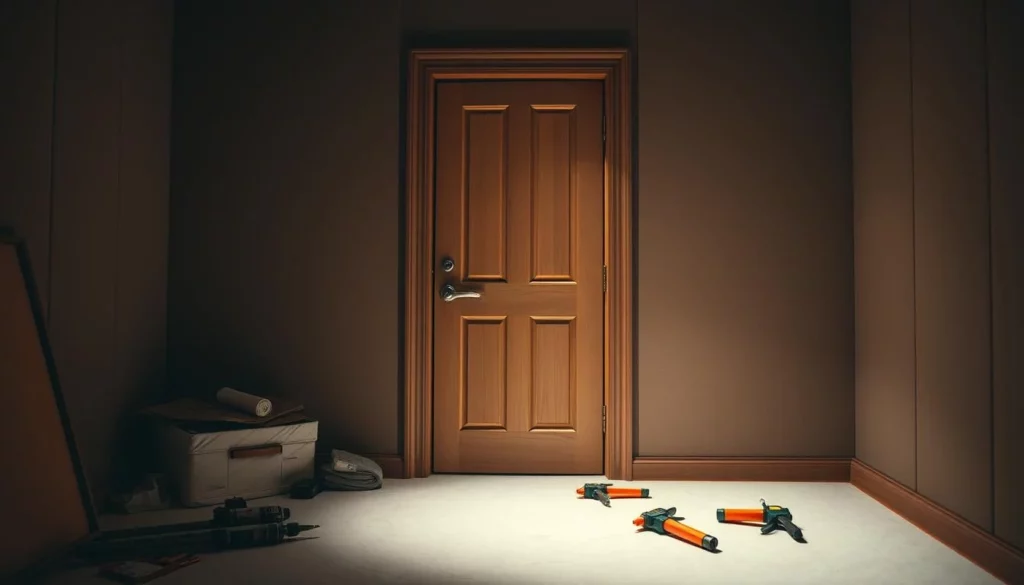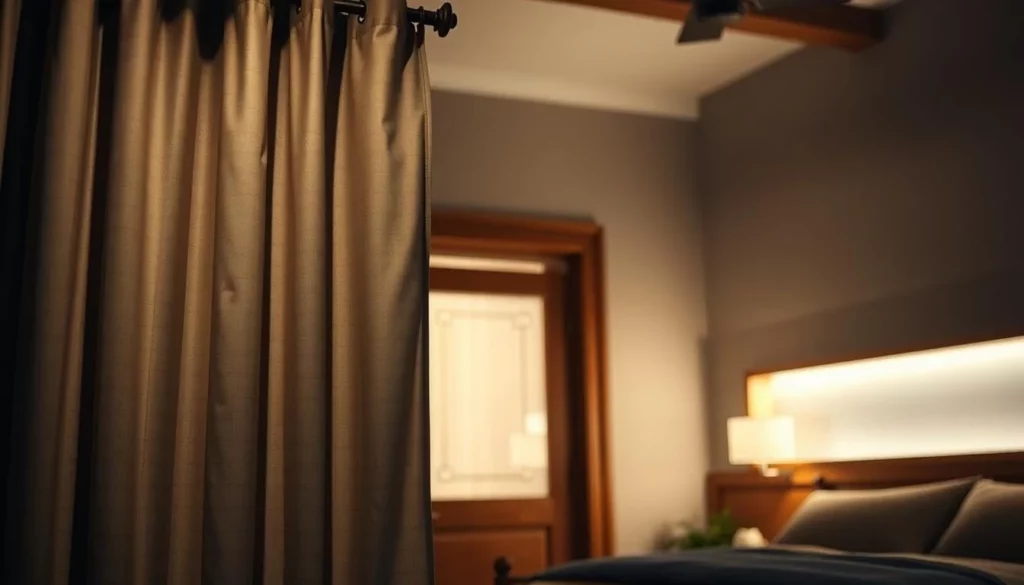Are you tired of noise coming into your home through your French doors? Adding soundproofing can change everything. It not only cuts down on noise but also makes your space look better.
Using solid core doors, double-glazed panes, and acoustic sealants can soundproof your doors well. The space between the panes helps block sound waves. This makes your home quieter and more peaceful.
Soundproofing your doors is a smart way to enhance your home’s feel. We’ll look at different ways to soundproof your doors in this article. This will help you choose the best option for your needs.
Understanding the Importance of Soundproofing
Soundproofing your home, like French doors, is key to a quieter living space. It’s not just about cutting down on noise. It’s about making your home a better place to live.
Benefits of Soundproofing Your Home
Soundproofing French doors offers many advantages. It can significantly reduce noise pollution, making your home quieter. It also helps with energy efficiency by sealing air leaks. Plus, it can boost your home’s aesthetic appeal by letting you enjoy outdoor spaces without noise.
Soundproofing does more than just reduce noise. It also makes your home more secure by making it harder for intruders to get in. A soundproofed home is also more appealing to potential buyers if you decide to sell.
| Benefits | Description |
|---|---|
| Noise Reduction | Significantly reduces external noise, creating a more peaceful living environment. |
| Energy Efficiency | Seals gaps that allow heated or cooled air to escape, reducing energy bills. |
| Aesthetic Appeal | Enhances your home’s appeal by allowing the enjoyment of outdoor spaces without external noise intrusion. |
Common Noise Issues with French Doors
French doors are beautiful but can let in noise. This is due to gaps and weak materials. Common problems include:
- Gaps under and around the doors
- Thin or hollow door material
- Inadequate sealing around the door frame
Fixing these issues can greatly improve your French doors’ soundproofing. Knowing these common problems is the first step to a quieter home.
Assessing Your Current French Doors
To soundproof your French doors, first check their condition and sound leaks. This step is key to picking the best soundproofing methods.
Identifying Gaps and Weaknesses
Look closely at your French doors for gaps or weak spots. Check the seals, frame, and threshold for wear or damage. Sound often leaks through:
- Gaps between doors and frame
- Cracks or holes in doors or frame
- Weak or damaged weatherstripping
- A worn-out door sweep
Use a candle or incense stick to find air leaks. Hold it near suspected gaps. If the flame flickers or smoke moves, you’ve found a leak.
Measuring Door Dimensions
Getting the right measurements for your French doors is crucial. Measure the width, height, and thickness of the doors and frame. Remember to note any irregularities.
Here’s how to measure your French doors:
- Measure the width of each door at different points.
- Measure the height from the top of the frame to the bottom.
- Record the door’s thickness.
By finding gaps and taking accurate measurements, you’re ready to pick and install the best soundproofing for your French doors.
Soundproofing Materials You Can Use
To soundproof your French doors, you’ll need to pick from various materials. The right ones can cut down on noise and make your home more comfortable.
Acoustic Panels and Foam
Acoustic panels and foam soak up sound waves, cutting down on echo and noise. You can put them on walls, ceilings, and doors to boost soundproofing. For a wide selection, check out Acoustical Surfaces.
Weatherstripping Options
Weatherstripping seals gaps between your French doors and the frame, stopping sound leaks. There are many types, like foam tape, felt, and vinyl. Pick the best one based on the gap size and door material.
Soundproof Door Sweeps
A soundproof door sweep fits at the bottom of your French door, sealing the gap. It greatly reduces noise and boosts soundproofing. For tips on a quieter home, visit Soundproof Spaces.
| Material | Purpose | Benefits |
|---|---|---|
| Acoustic Panels and Foam | Absorb sound waves | Reduces echo and noise transmission |
| Weatherstripping | Seal gaps between door and frame | Prevents sound leakage |
| Soundproof Door Sweeps | Seal gap between door and threshold | Reduces noise transmission |
Using these materials on your French doors can make your living space quieter and more comfy. The secret to good soundproofing is to cover all gaps and weak spots in your doors.
Tools Required for Retrofitting
Before you start making your French doors soundproof, you need the right tools. Having the right equipment makes the job easier and faster.
Essential Hand Tools
You’ll need some basic tools to start. A tape measure is for measuring your doors. A screwdriver is for taking things apart and putting them back together. And a caulk gun is for sealing things up.
A utility knife is handy for cutting materials to fit. These tools are the foundation for your soundproofing project.
Specialized Instruments
For more complex soundproofing, you’ll need special tools. A drill is key for making holes and installing new parts. A weatherstrip testing kit helps find gaps in your doors.
Using a silicone-based lubricant on hinges or screws can also help block noise. These tools are crucial for a successful soundproofing job.
With these tools, you’re ready to improve your French doors’ soundproofing. You’ll enjoy better noise reduction.
Step-by-Step Guide to Retrofitting
Follow a detailed guide to retrofit your French doors for better soundproofing. This involves preparing your doors and adding the right soundproofing materials. A well-prepared door ensures the materials work well to block noise.
Preparing Your French Doors
Start by checking your French doors for gaps or weaknesses. Look at the door frames, hinges, and the door itself for wear or damage.
Inspecting and Cleaning: Clean the doors well to remove dirt or debris that could affect the soundproofing. Use a damp cloth to clean the doors and frames.
Installing Soundproofing Materials
After preparing your doors, you can install soundproofing materials. Choose materials based on your door’s needs. Options include acoustic panels, weatherstripping, and soundproof door sweeps.
| Soundproofing Material | Purpose | Installation Tips |
|---|---|---|
| Acoustic Panels | Reduces echo and absorbs sound | Mount on walls or door panels |
| Weatherstripping | Seals gaps between door and frame | Apply around door frame |
| Soundproof Door Sweeps | Seals gap between door and threshold | Attach to bottom of door |
By following these steps and picking the right materials, you can improve your French doors’ soundproofing. Test your soundproofing after installation to see if it meets your needs.
Sealing Gaps Around the Frame
Soundproofing French doors well means paying close attention to the gaps around the frame. Gaps and cracks can let noise in or out, ruining your soundproofing efforts.
Sealing these gaps is key to keeping your soundproofing strong. You can do this with the right materials and methods.
Techniques for Effective Sealing
To seal gaps well, first find all spots where sound can leak. Check the frame for any cracks or gaps. Clean the area around the gaps for a better seal.
- Apply acoustic sealant to the gaps, using a caulk gun for precise application.
- Use weatherstripping around the door frame to seal any gaps between the door and the frame.
- Ensure the sealant is fully dry before testing the soundproofing effectiveness.
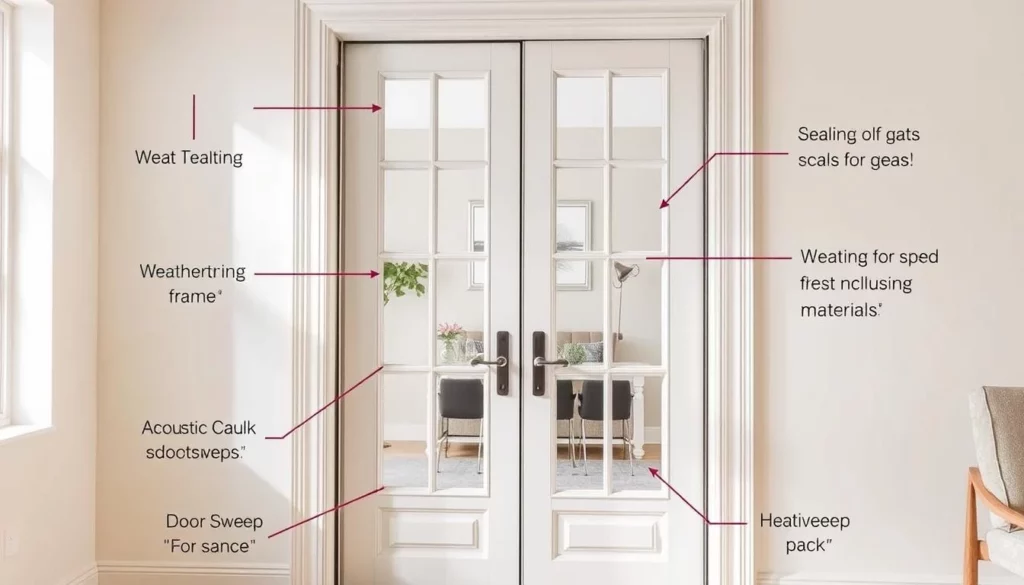
Choosing the Right Sealant
The right sealant depends on the gap size and your French doors’ material. Acoustic sealants are best for soundproofing because they block noise.
When picking a sealant, think about:
- The material of your French doors (wood, metal, or vinyl).
- The size and location of the gaps.
- The durability and flexibility of the sealant.
Choosing the right sealant and applying it right can greatly improve your French doors’ soundproofing.
Enhancing Door Hardware for Soundproofing
Improving your door hardware is key to soundproofing French doors. The parts like hinges, handles, and locks are crucial. They affect how well doors block noise. Upgrading these can greatly improve your doors’ soundproofing.
Upgrading Hinges and Handles
Hinges and handles are more than just functional. They also impact soundproofing. Choosing hinges that reduce noise can help a lot. Handles that fit well and don’t leave gaps also prevent sound from escaping.
When picking new hinges and handles, focus on their material and design. Heavy, solid parts are better at blocking sound than light ones. Look for ones with features to reduce noise or are made for soundproofing.
Utilizing Heavy-Duty Locks
Locks are also important for soundproofing. Heavy-duty locks offer better security and help block sound by sealing the door better. Choose a lock that works well with soundproofing materials for the best results.
| Hardware Component | Soundproofing Benefit | Upgrade Recommendation |
|---|---|---|
| Hinges | Minimize noise transmission | Noise-reducing hinge designs |
| Handles | Prevent sound leakage | Solid, heavy-duty constructions |
| Locks | Ensure a tighter seal | Heavy-duty locks with soundproofing compatibility |
Upgrading your door hardware can greatly improve soundproofing. Use noise-reducing hinges, handles that fit well, and heavy-duty locks. This, along with other soundproofing steps, will make your home quieter.
Testing Your Soundproofing Effectiveness
After you’ve made your French doors soundproof, it’s important to test them. This step checks if your doors are really blocking out noise. It makes your home quieter and more peaceful.
To measure how well your doors block sound, you’ll need to use a sound level meter. This tool shows sound intensity in decibels (dB). By measuring before and after, you can see how much noise your doors cut down.
Noise Level Measurement Techniques
There are a few ways to measure noise levels:
- Sound Level Meter: This device gives exact sound intensity readings. You can find basic and advanced models, some of which log data.
- Smartphone Apps: Some apps turn your phone into a sound level meter. They’re not as precise but can give a good guess.
- Comparative Listening: This method involves listening to compare before and after soundproofing. It’s not exact but can give a rough idea.
Fine-Tuning Your Retrofits
After testing, you might need to tweak your soundproofing. Look for any gaps or weak spots and fix them. Focus on these areas:
- Sealing Gaps and Cracks: Use acoustic sealants to fill gaps around the door frame and between doors. This stops sound from leaking.
- Enhancing Weatherstripping: Make sure weatherstripping around your doors is good and in place. New or replaced weatherstripping can help a lot.
- Upgrading Soundproofing Materials: If your materials aren’t doing the job, try better ones or add more layers.
By carefully testing and adjusting your soundproofing, you can make sure your French doors really block out noise. This makes your home quieter and more peaceful.
Maintenance Tips for Soundproofed Doors
Keeping your French doors soundproofed means more than just installing them. It’s also about regular care. This care is key to keeping your doors working well over time.
Regular Checks and Fixes
It’s important to check your doors often for any gaps or weak spots. Look at the seals around your doors for wear or damage. Check the weatherstripping and door sweeps for gaps or damage too. If you spot any problems, fix or replace them right away to keep the sound out.
Don’t forget to check the door hinges and handles. Tightening any loose screws helps keep the door in place and soundproofing working right.
| Component | Inspection Tips | Repair/Replacement Tips |
|---|---|---|
| Weatherstripping | Check for gaps, wear, or damage | Replace if damaged; ensure proper sealing |
| Door Sweeps | Inspect for wear or misalignment | Adjust or replace to ensure proper contact with the threshold |
| Hinges and Handles | Tighten any loose screws | Replace if damaged or worn out |
Cleaning Soundproofing Materials
Keeping your soundproofing materials clean is important. Dust and dirt can build up on acoustic panels and foam, making them less effective. Use a soft brush or a vacuum with a gentle setting to clean them.
For weatherstripping and door sweeps, use a damp cloth to clean off dirt and debris. Stay away from harsh chemicals or abrasive cleaners that could harm the materials.
By following these maintenance tips, your soundproofed French doors will keep your home quieter and more comfortable.
Conclusion: Enjoying a Quieter Home
Adding soundproofing to your French doors can make your home much better. It cuts down on noise, making your space quieter. This helps you relax and work better.
Practical Benefits of Soundproofing
Soundproofing your French doors is a smart way to reduce noise. There are many soundproofing options for French doors. Choosing the right one can greatly lower noise levels, making your home more enjoyable.
Long-Term Advantages
Soundproofing your French doors also boosts your home’s value and your well-being. It makes your home quieter and more comfortable. Look into different soundproofing options to find the best fit for you.
